
“I wanted respect from other musicians,» she says of new album ‘Treat Myself’
Meghan Trainor remembers exactly when she realized pop music was changing. It was the spring of 2018 and she was just starting to promote her third album, Treat Myself. Its lead single, “No Excuses,” had peaked at No. 46 on the Billboard Hot 100 — a solid showing, if lower than past lead singles like “All About That Bass,” which hit No. 1 in 2014 — and her team had turned their attention to its follow-up, a laid-back disco track called “Let You Be Right.”
“The label, management, my whole team were really confident in it,” recalls Trainor. “Radio guys were telling them, ‘It’s the only song that will work [off the new album].’ And for the first time I was like, ‘Alright, I’ll do what you all want to do.’ ” As it turned out, “Let You Be Right” didn’t even crack the Hot 100. “That shit was wrong,” she says of her team’s prediction, forcing out a sneering laugh and adding: “Sorry, I’m getting fired up.”

So, Trainor went back to the drawing board. It wasn’t the first time she had something to prove: Following the viral success of “All About That Bass,” she says, “I was told to my face, ‘You’re going to be a one-hit wonder.’ ” Instead, she focused on her songwriting and went on to collect five more top 20 Hot 100 hits as well as a Grammy for best new artist in 2016. But when she returned to the studio to rework Treat Myself, however, she realized other writers and producers around her were all struggling to answer the same question: How do you make pop records that feel relevant in an era when hip-hop reigns? “They said, ‘We’re in the same predicament: We don’t know what to do, we don’t know what to write, we don’t know how to stay cool,’ ” says Trainor. “I wrote four albums [of material] because I was adapting to what’s going on in the music industry. I got into such a dark place of, ‘I don’t know how to follow all these rules.’ ”
As a result, on Treat Myself — out Jan. 31 on Epic Records — Trainor embraces pop’s streaming era by offering a variety of sonic approaches. Long associated with her wholesome, doo-wop-inspired sound, the 26-year-old approached her album like the playlists she grew up with, skipping around from futuristic funk (“Genetics,” which features the recently reunited Pussycat Dolls and has a chorus begging for TikTok memes) to hushed coffee-shop jams (“Workin’ On It,” featuring Lennon Stella and Sasha Sloan). And though Trainor has rapped on her songs before, she has found more natural ways to tap into what’s happening in hip-hop along the way: The choir-like backing vocals on dark, throbbing tracks like “Babygirl” and “Wave,” she says, were inspired by her visits to Kanye West’s Sunday Service gospel events.
“I’ve heard weird opinions from everyone [about what the album should be], so I kept writing the best songs I could,” Trainor says while looking over a copy of the tracklist — she recorded so much material over the past few years that she couldn’t remember exactly what made the final cut. “Every time I accomplished a new step in my songwriting world, my brain would go, ‘Uh-oh, the rest of the album needs to be this good.’ And finally I got to a place where my label and I were like, ‘Okay, I can’t beat these songs.’ ”
In doing so, she embodies a class of artists, including Charlie Puth and The Chainsmokers, who have escaped from the shadow of a notorious, novelty-like hit and surprised audiences with material that was, if not more successful, at least more acclaimed — and abundant. Just as those artists have embraced free-flowing singles and unconventional rollouts, Trainor maintained a prolific pace while recording Treat Myself: She released an EP (last February’s The Love Train), contributed to a handful of soundtracks (from the comedy The Hustle to the animated Playmobil: The Movie) and collaborated with artists like CNCO and Kaskade. More recently, she started writing original Christmas songs that she hopes to release later in 2020.
Trainor still prides herself on being a feel-good, family-friendly artist you can play in any room — a quality that makes her a natural fit to open for Maroon 5 on its upcoming North American tour of arenas and stadiums, which begins May 30. And she’s still writing about self-love and body positivity on her new album, not because it’s part of her brand, but because she says she still needs those songs for herself. “I have days when I hate myself and have to really work on it,” she says. “It’s a struggle all the time.”
Yet with Treat Myself, Trainor had a new goal. “I wanted respect from other musicians, I didn’t care if radio would play it or not,” she says of tracks like “Wave,” which she wrote right after turning in her second album, 2016’s Thank You, but held onto until she linked up with producer Mike Sabath (Chris Brown, Liam Payne) last year. “Wave” is part moody ballad, part gym-ready bop, with a shape-shifting beat that slithers in and out — in other words, it’s entirely unlike anything Trainor has released before. “I’ve been told that radio is scared of it,” says Trainor. “They’re like, ‘It’s just so different, we can’t wrap our heads around it.’ It boggles my mind.”
Having a radio hit is no longer a point of stress, though. Those early — and in some ways still ongoing — battles for credibility have inspired Trainor to make uplifting rising artists a new mission. She remembers the doors that opened for her after John Legend appeared on her 2015 song “Like I’m Gonna Lose You,” and she tries to give out similar co-signs. After writing “Workin’ On It,” Trainor recalls, “Sasha was like, ‘If you want a bigger star on the song, feel free to cut me out and put someone else on here.’ I was like, ‘Are you joking? You’re my superstar.’ ” She also recruited labelmate AJ Mitchell for the ballad “After You” because she wanted audiences to recognize his vocal talents, telling his manager, “Dude, the kid can sing. We should show a different side of him to the world.”
Changes in her personal life have helped Trainor tune out industry politics and reconnect with songwriting for the fun of it. While working on the album, she at times grew impatient with delays and instructions to wait her turn. (“Radio [people would tell] my team, ‘Do not release right now, we are committed to these five artists,’ ” she says.) In response, she chilled out: She married actor Daryl Sabara in late 2018, adopted some dogs and built a home studio. “I wanted to take time to myself and just live my best life,” she says. “I became a much happier person.”
Much of what ultimately made the album came from this period. “When I’m just trying to write my favorite songs, I’m booked and blessed,” she says of finally cracking Treat Myself. “Of course I want my songs to have a moment again, because I work so hard on them, but if it doesn’t happen, I’m finally at this place where I’m letting go.”
this article was originally published by: Billboard




